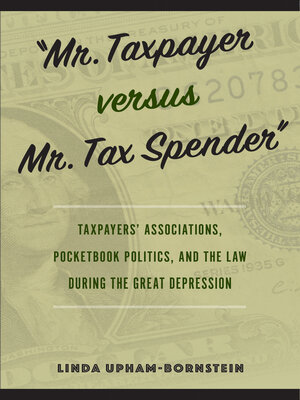"Mr. Taxpayer versus Mr. Tax Spender"
ebook ∣ Taxpayers' Associations, Pocketbook Politics, and the Law during the Great Depression
By Linda Upham-Bornstein

Sign up to save your library
With an OverDrive account, you can save your favorite libraries for at-a-glance information about availability. Find out more about OverDrive accounts.
Find this title in Libby, the library reading app by OverDrive.



Search for a digital library with this title
Title found at these libraries:
| Library Name | Distance |
|---|---|
| Loading... |
During the Great Depression, the proliferation of local taxpayers' associations was dramatic and unprecedented. The justly concerned members of these organizations examined the operations of state, city, and county governments, then pressed local officials for operational and fiscal reforms. These associations aimed to reduce the cost of state and local governments to make operations more efficient and less expensive.
"Mr. Taxpayer versus Mr. Tax Spender" presents a comprehensive overview of these grassroots taxpayers' leagues beginning in the 1860s and shows how they evolved during their heyday in the 1930s. Linda Upham-Bornstein chronicles the ways these taxpayers associations organized as well as the tools they used—constructive economy, political efforts, tax strikes, and tax revolt through litigation—to achieve their objectives.
Taxpayer activity was a direct consequence of—and a response to—the economic crisis of the Great Depression and the expansion of the size and scope of government. "Mr. Taxpayer versus Mr. Tax Spender" connects collective tax resistance in the 1930s to the populist tradition in American politics and to other broad impulses in American political and legal history.
"Mr. Taxpayer versus Mr. Tax Spender" presents a comprehensive overview of these grassroots taxpayers' leagues beginning in the 1860s and shows how they evolved during their heyday in the 1930s. Linda Upham-Bornstein chronicles the ways these taxpayers associations organized as well as the tools they used—constructive economy, political efforts, tax strikes, and tax revolt through litigation—to achieve their objectives.
Taxpayer activity was a direct consequence of—and a response to—the economic crisis of the Great Depression and the expansion of the size and scope of government. "Mr. Taxpayer versus Mr. Tax Spender" connects collective tax resistance in the 1930s to the populist tradition in American politics and to other broad impulses in American political and legal history.







